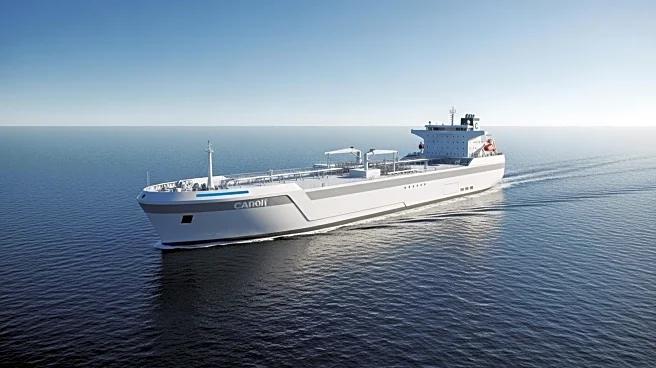What's Happening?
The global marine bunker oil market is anticipated to grow significantly, reaching a valuation of $280.7 billion by 2033. This growth is driven by a compound annual growth rate of 6.5% from 2024 to 2033, according to Allied Analytics LLP. The expansion is largely attributed to the increasing demand for cleaner marine fuels, the rapid expansion of maritime trade, and government mandates aimed at reducing sulfur emissions from shipping activities. The Asia Pacific region, which accounted for the largest market share in 2023, is expected to maintain its dominance due to its high maritime trade volume and the presence of major bunkering ports such as Singapore, Shanghai, and Hong Kong. Countries like China, South Korea, and India are expanding their port infrastructure and shipping capabilities, contributing to the rise in marine fuel consumption.
Why It's Important?
The projected growth of the marine bunker oil market is significant for several reasons. As maritime shipping accounts for approximately 90% of global trade, advancements in fuel technology and compliance with environmental policies can have extensive impacts on global trade dynamics. The shift towards cleaner fuels and the adoption of digital monitoring for fuel efficiency are expected to drive innovation and sustainability in the industry. This transition not only supports environmental goals but also positions the Asia Pacific region as a leader in maritime trade and technology. The increased investment in cleaner fuel alternatives and the development of dual-fuel and hybrid propulsion systems in new vessel constructions highlight a broader industry trend towards sustainability.
What's Next?
The marine bunker oil market is likely to see continued diversification and innovation as the industry adapts to new environmental regulations and technological advancements. Stakeholders, including fuel providers and shipping firms, are expected to form partnerships to enhance fuel efficiency and compliance. The focus on cleaner fuels and sustainable practices may also lead to increased research and development efforts, potentially influencing global shipping policies and practices. As the market evolves, companies in the Asia Pacific region may further solidify their positions as leaders in maritime trade and technology.
Beyond the Headlines
The shift towards cleaner marine fuels and the adoption of advanced technologies in the shipping industry could have long-term implications for global trade and environmental policies. The emphasis on sustainability may drive regulatory changes and influence international shipping standards. Additionally, the economic impact of these changes could extend beyond the shipping industry, affecting related sectors such as manufacturing, logistics, and energy production. The transition to cleaner fuels may also prompt discussions on the ethical responsibilities of industries in addressing climate change and environmental sustainability.









